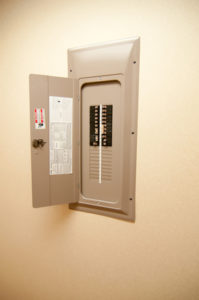 Your home’s electrical panel is the command center for powering your home. It’s the metal box on a wall that you have to open when a breaker trips, and it controls whether power is being sent to each room or area of the house. It’s important to know where your electrical panel is in case there’s a power outage, and it also needs to be accessible to turn off power in order for a residential electrician to perform repairs or installations safely.
Your home’s electrical panel is the command center for powering your home. It’s the metal box on a wall that you have to open when a breaker trips, and it controls whether power is being sent to each room or area of the house. It’s important to know where your electrical panel is in case there’s a power outage, and it also needs to be accessible to turn off power in order for a residential electrician to perform repairs or installations safely.
If you’ve been experiencing inadequate power and electrical outages, or if you need to retrofit an older home with modern technology, it may be time to upgrade the electrical panel. By contacting an electrician residential homeowners can determine if the panel should take the blame for problems you’ve been experiencing.
How an electrical panel powers your home
The electrical panel is like a phone operator, relaying power to different circuits throughout the home. Circuits need adequate power to operate your electrical outlets, overhead lights, appliances, and everything else that’s wired in the home.
By routing power to different circuits, you have enough power going to each area so that the circuit doesn’t get overloaded. It also ensures that you do not have a dangerous amount of electricity being sent to any one particular place.
The panel includes a main breaker and a series of breakers. The main breaker can turn power on or off throughout the entire system. The other breakers each control a designated area; these should really be labeled inside the panel box (such as by numbering the breakers and posting a key on the panel door). You might want to ask an electrician for residential electrical panel guidance on determining what exact locations correspond to each breaker, especially if it seems like each breaker does not simply control a specific room.
Older homes were wired with fuse boxes instead of circuit breaker panels. In a simple sense, fuses operate similarly to circuit breakers, but feature fuse plugs screwed in rather than breaker switches.
Common issues with an electrical panel
Chances are that you and your family are using more electronic devices and other plugged-in items these days. We still have our toasters and televisions, but we also have our internet routers, DVD players, and single-cup coffee machines. Unless your house is brand new, the electrical panel and wiring probably pre-date those inventions.
If your panel struggles to power your home, you’ll notice the symptoms. Breakers will trip, shutting off power in various areas or even the entire home. This can happen because you are using a large number of electric devices in one location, but it might also happen more randomly. By asking your trusted electrician residential customers can determine what upgrades or changes will fix the problem.
Older fuse box systems are more likely to experience problems these days and an electrician with residential expertise can advise you on upgrading the entire system. When overloaded, a fuse can blow out and needs replacement, as opposed to a tripped breaker that just needs to be flipped back on.
Reasons for professional electrician residential upgrades
In addition to frequently tripped breakers and blown fuses, a professional electrician of residential work will suggest upgrades for these telltale signs:
- your home is more than twenty years old
- the panel has fewer than 200 amps of power
- your lights tend to flicker
- you don’t have enough outlets so you use a clutter of power strips

